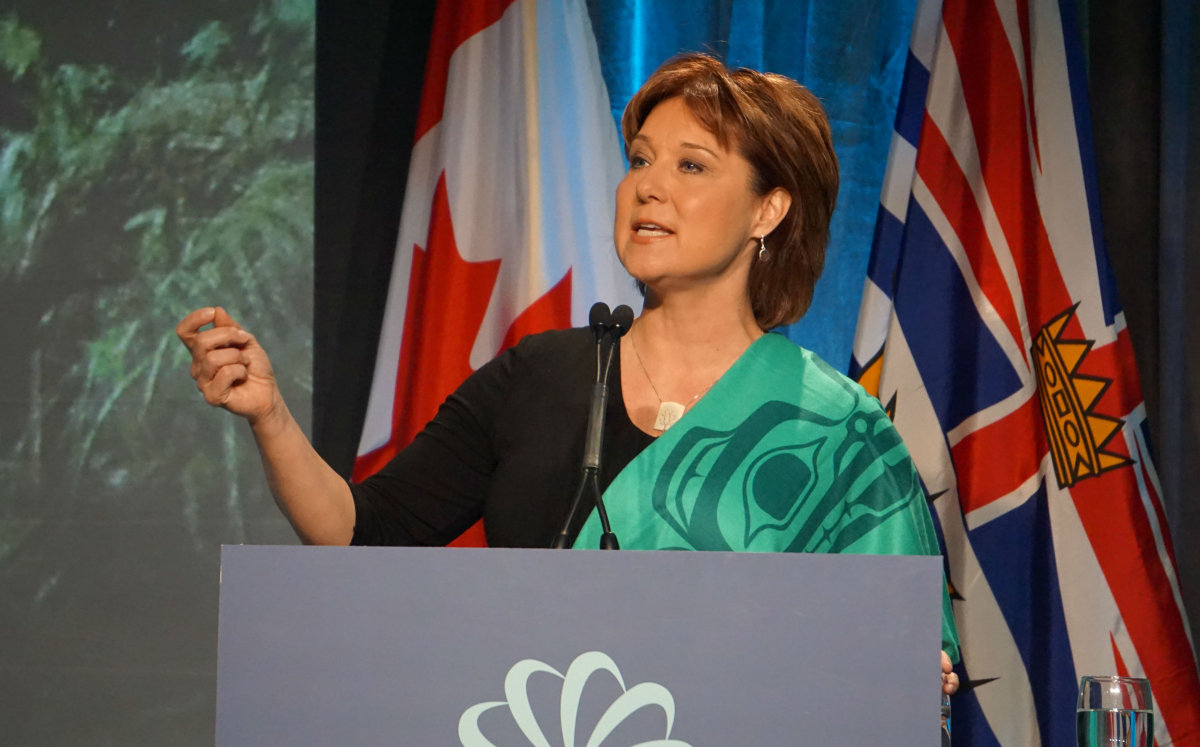Support strong Canadian climate journalism for 2025
After years of dramatic opposition by B.C. residents, the controversial pipeline expansion project of a Texas-based energy company, Kinder Morgan, is one step closer to breaking ground in Canada.
On Wednesday, the government of B.C. Premier Christy Clark issued an environmental assessment certificate for the proposed Trans Mountain pipeline expansion, which aims to triple the capacity of an existing system that already ships more than 300,000 barrels of oil per day from Alberta's oilsands to the West Coast.
Speaking to reporters in Victoria, Clark said Wednesday all five conditions for her approval of the Kinder Morgan pipeline have now been met, after coming to a deal with Kinder Morgan to collect between $25 million and $50 million annually for 20 years as the province’s “fair share” of benefit from the project.
Clark wants best for British Columbia
"We've worked to make sure we got as much for B.C as we possibly could," Clark told reporters. "The fact that British Columbians got behind the five conditions passionately meant we were able to get real improvements."
She cited the federal government's new $1.5 billion-National Oceans Protection Plan as a safety precaution her government was able to negotiate through the five financial, legal and environmental conditions it has outlined as a requirement to support the pipeline expansion. Other conditions required the company to address consultation and economic obligations to First Nations, and provide a "world-leading" oil spill response plan and prevention plan.
The environmental green light comes with 37 provincial conditions, intended to supplement the 157 conditions required by Environment and Climate Change Canada, which approved the Trans Mountain pipeline last November. Those conditions included a requirement to offset greenhouse gas emissions generated during construction, among others.
A recommendation letter signed Dec. 8, 2016 a member of B.C.'s Environmental Assessment Office (EAO) expresses confidence in those conditions, along with those imposed by the province:
"I am satisfied that... the potential adverse impacts on areas of provincial interest and jurisdiction have been avoided, minimized or otherwise accommodated to an acceptable level," wrote Kevin Jardine, executive director of the EAO. "I agree with EAO's conclusion that the Crown has fulfilled its obligations for consultation and accommodation to Aboriginal groups and I am satisfied that there will be ongoing efforts to engage and consult with Aboriginal groups by the Proponent and the federal and provincial governments."
In a news statement Kinder Morgan's Trans Mountain "welcomed" the news.
“Trans Mountain shares the values and priorities of safety, environmental protection and prosperity for communities that B.C.’s 5 Conditions represent," Kinder Morgan Canada president Ian Anderson said. "We believe this represents a positive outcome for our company, customers and for British Columbians and all Canadians who will benefit from the construction and operation of an expanded pipeline.”
A polarizing pipeline
But thousands of residents across B.C. whole-heartedly disagree with Anderson.
In a report released late last year by the federal panel appointed to collect additional public feedback on the project, the Trans Mountain expansion was described as being among the most "controversial in the country, perhaps in the world, today."
In 2014, more than 100 people were arrested on Burnaby Mountain in B.C. over a weeks-long protest to oppose the project, and to date, at least 17 First Nations and 21 municipalities have formally opposed it. Asked about British Columbian residents who continued to reject the pipeline due to the risks it poses to sensitive land and water ecosystems, Clark responded:
"I don't know. To me, it's not really a political thing. We set the five conditions it was a path to get to yes, and we got to yes."
If the project were built, it would ship roughly 890,000 barrels of crude oil and petroleum per day to refineries and terminals near Vancouver and Washington. Supporters of the project say it would create more than $46 billion in revenue for provincial and federal governments and at least 15,000 jobs per year during construction. But it would also cross unceded Indigenous territory, increase tanker traffic in local waters by 600 per cent, and threaten endangered local orca populations.
In a press statement, B.C. Environment Minister Mary Polak cited its financial benefits and expressed confidence that the pipeline would not do significant harm to B.C.'s environment.
"Clearly, the project will have economic benefits for British Columbia workers, families and communities," said Polak. "However, we have always been clear economic development will not come at the expense of the environment. We believe environmental protection and economic development can occur together, and the conditions attached to the EA certificate reflect that.”

"Disappointing but not surprising"
The Trans Mountain expansion passes and its related shipping activities pass near or through the territories of more than 90 aboriginal groups in B.C. Many of the First Nations have opposed it, and some — including the Tsleil-Waututh and Squamish — have filed lawsuits aiming to stop the project.
Eugene Kung of West Coast Environmental Law, who represents the Tsleil-Waututh First Nation's Sacred Trust Initiative, said the government's decision was "disappointing but not surprising." He questioned how the province could approve a project after Vancouver struggled to respond to a small-scale diesel spill along English Bay in April 2015, and said "world class" spill response it has repeatedly touted, generally means around 15 per cent of oil recovery for conventional oil.
Trans Mountain pipeline expansion would carry diluted bitumen, which experts have found nearly impossible to cleanup once it mixes with sediment in water and sinks.
According to Kinder Morgan, the pipeline expansion will generate more than $46 billion in government revenue for provincial and federal governments, and at least 15,000 jobs annually during construction. But critics of the project argue that only around 50 of the jobs will be permanent, and that the resulting increase in oil tanker traffic through the Burrard Inlet from 60 to 400 tankers a year poses a risk to Vancouver's coast.






Comments
Liz May's facebook tells me China is going to go heavily into green technology and it will create 13 million new jobs. And on and on Canada goes with its oily non future.
Jenny, thank you for this - to say Clark's announcement is a disappointment is an understatement. VERY SAD for many of us.
It's always so amazing to me how individuals like premier Clarke are blinded by economic development. It seems that this is the only alternative to what is perceived as quality of life. I know it's important but at what expense. Does the pipeline justify the potential loss to the box coastline and ocean. And with the huge increase in tanker traffic, there will be a spill which will devastate the area. Developing Green energies would create jobs and economic development and grant it, it would investment by government and cost tax payers in the short term but it will cost tax payers for a fuel spill cleanup as well and probably much more than developing green energies.
I would like to ask the B.C. government and the Canadian government how much of that anticipated $46 billion revenue from this project they are willing to commit to environmental cleanup WHEN a spill or other disaster occurs and recurs, and how much the Kinder-Morgan company will be fined each time they are in violation of agreed safeguards and conditions. How much of the cost of environmental and economic remediation will the company bear?
I would also like to know just how much Christy Clark understands about the environmental and social impacts of this project and how her Environment Minister Mary Polak can possibly say that "economic development will not come at the expense of the environment" when any experienced environmentalist knows that it always comes at some expense to the environment.
Also I would like to make it clear to our political decision makers that the "duty to consult" with our First Nations involves not just informing them of decisions or negotiating a monetary settlement but requires listening to what they say and responding to their concerns and abiding by their decisions.
I would also ask Christy Clark, if environmental protest and opposition "is not a political thing" then what is it? and why is the government making the decisions?
Clearly all these government leaders can see is the prospect of high revenues and their concern for or their understanding of the consequences and the price of them is not considered.
Christy Clark has become BC's Trump. :((
In effect she has boarded his "Climate Change is a Hoax Train."
I love how they keep saying "jobs" and "government revenue" in conjunction with these projects. That's straight from the neoliberal playbook of political confectionery. What they will not say to the public is that the primary goal is profit making. How does Kinder Morgan intend to make its profits as large as possible?: a) eliminate as many actual jobs as they can, b) pay zero or as close to zero into the government revenue stream as possible, and c) spend the absolute bare minimum on 'safety' measures. They hire accountants and lawyers specifically tasked with those goals. That is the simple reality; Kinder Morgan is not in business to give us jobs or a clean environment. It is in business to make as much money as they can in as short a time as possible.
It should be of interest to us that Kinder Morgan is absolutely clear on it's profit-making interests when it communicates to investors. Read their annual reports and listen in on their conference calls (to investors). But that's not part of the script when they or their sock puppet political shills communicate to the public. To us: 'We want to bring you jobs, jobs, jobs and we want to pay ooodles of revenue to government cuz we just love to support public schools and universal medical care.'
These politicians do not have a clue to the degree they are Endangering Public Safety! Allowing a 63 year old pipeline to remain in service is also Environmental Negligence. The dilutant is highly flamable Vs the crude now being pushed through the aged pipeline. We had 15 year old pipeline bursting with water pressure from Hydrostatic Testing in Northern Ontario in the early 70's. You cannot do hydrostatic testing on Oil Pipelines because the test water is highly contaminated and cannot be returned to source, Eg a nearby river or lake.
If the natural gas pipeline explosion of 2010 overlooking the town of Beardmore ON had crude oil the hamlet of Beardmore would have preceded the inferno in Lac Megantic of July 2013 from an un-manned train running down a hill carrying a more explosive type of oil from the Bakken Oil Field in North Dakota.
Snow was melting off of rooftops in Beardmore as it was a vertical gas flare. Oil runs downhill, check out the TSB, Transportation Safety Board Report who have conveniently removed the pictures of "Outside Pipe Corrosion" as i was referencing people open up the file to examine the evidence.
PDF]
Pipeline Investigation Report P11H0011
www.tsb.gc.ca/eng/rapports-reports/pipeline/2011/p11h0011/p11h0011.pdf
Feb 19, 2011 - pipeline fire and explosion near Beardmore, Ontario. At the time of ..... During the investigation into the June 1990 TransCanada pipeline failure (TSB Investigation .... For 2009 and 2010, the “on” potential values for the valve.
The MAP is priceless because it shows the Inactive Sections of Existing Pipeline which obviously had to be taken out of Service with 81 leaks in its history . The Re-Activated Sections were likely replaced sections. Again a 63 year old pipeline must be taken out of service and removed from the ground.
Supporters of the project say it would create more than $46 billion in revenue for provincial and federal governments and at least 15,000 jobs per year during construction. According to Kinder Morgan, the pipeline expansion will generate more than $46 billion in government revenue for provincial and federal governments, and at least 15,000 jobs annually during construction.
Pipelines are installed at dizzying speeds. The Pump Stations are a more time consuming aspect but 15,ooo jobs ANNUALLY is an awfully deceitful stretch. I would suspect 1,5oo workers during construction.
Will the Pump Stations be brought in fabricated in Modules at Non Union Shops out of Province and likely overseas? Check out the Gong Show with the Side Booms in this picture supplied by Kinder Morgan of pipe being replaced. Note my Comment.
Bell: Engagement makes for a stronger, safer and better pipeline project
By Lizette Parsons Bell in Opinion, Energy, Politics | October 11th 2016
https://www.nationalobserver.com/2016/10/11/opinion/bell-engagement-mak…
Of comparable similarities,Trans Canada Pipelines has no intent of doing any Hydrostatic Testing on their aged 60 year old Energy East Conn/version Proposal. The 2010 Beardmore Pipeline Explosion (TSB Report) would have preceded downtown Lac Megantic being turned into a piece of charcoal. TCP leased the Ontario Section which was built and paid for by the Northern Ontario Pipeline Crown Corporation in 1957. They ran with the taxpayer funded golden goose and never looked back.
Some small communities which were host to Compressor Stations were never hooked up to natural gas service. Eg. Jellicoe, Klotz Lake > Caramat, Mattice, Dorion. Towns east of Nipigon along Lake Superior’s rugged North Shore, Eg Terrace Bay, Marathon, Manitouwadge, Caramat, Hemlo, White River, Hornepayne and Wawa have flat plateaus northward to the Hwy 11 pipeline corridor were never hooked up. For 60 years these residents have been buying more expensive and polluting sources of energy for home heating and Industrial uses.
The Ontario Rural Growth Document gives a good understanding, but remember the first pipeline built in 1957 through Northern Ontario was paid for by Canadian taxpayers.
Ref: www.ontarioruralgrowth.ca that shows the energy quandary Kent and Bruce County are in 60 years after Toronto was hooked up with natural gas by that taxpayer funded pipeline.
Of treasonous concern are the 20 some LNG Terminals for exporting fracked natural gas, being promoted by BC’s new MINISTER OF NATURAL GAS, and the Commodity Traitors that conjure up these schemes. meanwhile countless communities in Canada are without the least polluting source of home heating.
I want to thank the dedicated reporters with the National Observer for exposing these most serious issues. In Eastern Canada we really need your support with the TCP, Energy East Application for Conn/verting a 60 year old natural gas pipeline to pump diluted bitumen to East Coast Shipping Terminals.